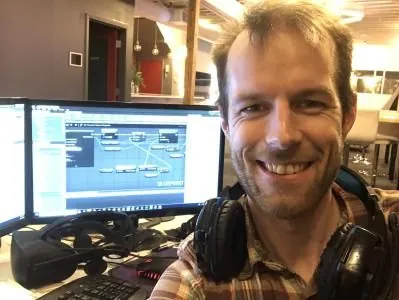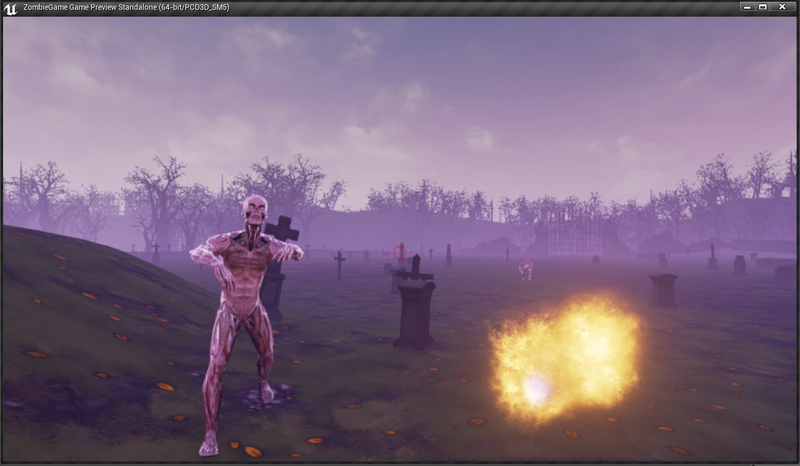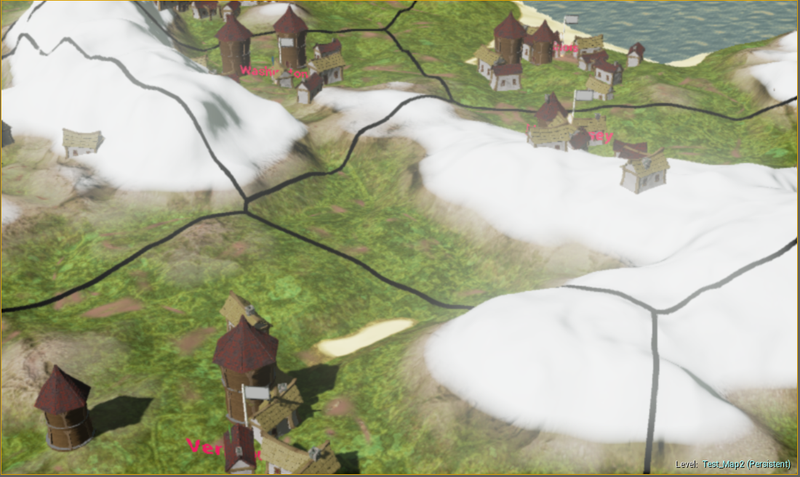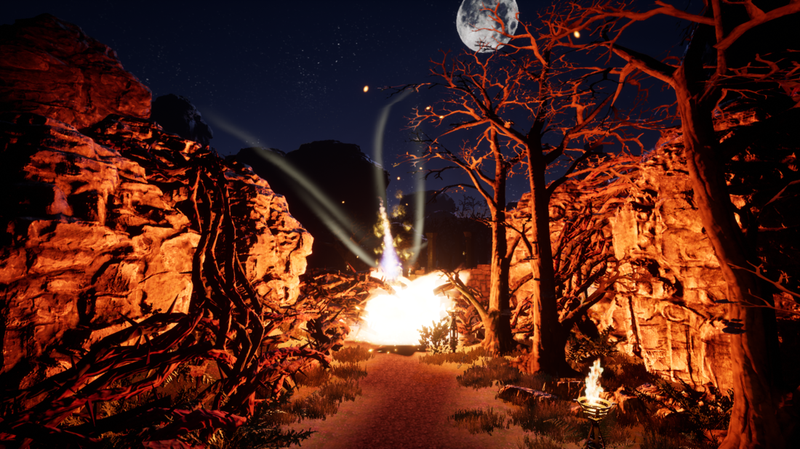Contributed by Steven Large from Indie Ranger. Check out their coverage of up-and-coming indie games and developers!
Developing a video game solo offers amazing creative freedom and incredibly difficult challenges.  Anyone who's worked solo on any kind of project — by choice or otherwise — knows how difficult it is to do all the work by themselves. Managing all the planning and making sure every little piece fits together to make the vision from back in the “Ideas” stage a reality is a stressful endeavor — and when there’s a problem, there’s no one to blame but yourself.
Anyone who's worked solo on any kind of project — by choice or otherwise — knows how difficult it is to do all the work by themselves. Managing all the planning and making sure every little piece fits together to make the vision from back in the “Ideas” stage a reality is a stressful endeavor — and when there’s a problem, there’s no one to blame but yourself.
Eric Nevala (@slayemin), the founder of Wobbly Duck Studios in Seattle, Washington, knows the struggle of solo developing a game from scratch. He’s been working on his game Spellbound for more than five years now and it has not always been easy, even before he started on the game.
His experience in being a solo developer allows him to offer a lot of tips on what it will be like for anyone thinking of creating their own video game, or any other kind of product.
Tip #1: Get a foundation: you’ll need some knowledge and experience
You can’t paint a good portrait without understanding how colors work, nor can you make a good video game without understanding how coding works.
Nevala first wanted to become a software developer back when he was 14 years old. He was playing Commander Keen, an old-school platformer where you collect all sorts of different candy and jump on monsters with a pogo stick, when he had an epiphany.
“One day over the summer, it dawned on me,” he said. “I was like ‘holy crap! Somebody made my favorite game!’ I want to make a game too. I discovered you have to be a programmer if you want to make games. Whatever it takes to make games, I’m going to [do] that.”
This was back in the days before the internet had really become a thing, so there was no YouTube or tech forums to use as a learning tool. Nevala said he tried to teach himself QBasic, a beginners programming language, using an unhelpful help file.
“It was really challenging and I almost gave up,” he said.
His high school offered introductory classes in visual programming, so he took them and did well because he was extremely motivated. However, as the classes became more advanced, he started to do less well. Still, his dream of making a video game was in his grasp, so he kept pushing forward.
After finishing high school and some college, Nevala started working in software development as an independent contractor, mostly building HTML websites. He then served in the Marine Corps as a reservist in the civil affairs unit. As a webmaster for the unit, it was his job to build a reconstruction management tool that would be used to help rebuild Iraq’s infrastructure after the initial invasion in 2003.
“We had all these different projects being done by all these different units, like the Army Corps of Engineers and the Navy Construction Battalion and no one was really tracking anything,” Nevala said. “It was all pretty much just Excel spreadsheets. So I spent about three months building a tool from the ground up.”
Three months worth of consecutive 18-hour days and 20,000 lines of code later and Nevala had given the reconstruction effort a better way to manage its projects. He said the impetus for working so hard was to help the people of Iraq.
“The idea was the faster I get this project done, the faster we can bring peace to the country,” Nevala said. “That was my motivation behind it.”
After serving, Nevala worked as a contractor in Afghanistan for 18 months, saving everything he could to get his company started. He founded Wobbly Duck Studios in 2013.
Tip #2: Have a goal in mind
Having something you want to accomplish with the product you’re making will go a long way in keeping you motivated to work on it. When Nevala built the management tool in Iraq, he wanted to help bring peace to the region. With Spellbound, he wants to make people better through storytelling.
“I think people fight each other because of misunderstandings and misalignments in values,” Nevala said. “My idea is the way people get their values in partially informed by the media they consume — and that includes video games — so maybe I can use games to help people become better by informing some ideas in them.”
Nevala believes storytelling in any media is a way of instilling values in people. With Spellbound, he wants to tell engaging stories and make people take a step back to think about other worldviews and give people a better way of understanding of one another.
“My goal with Spellbound is to tell stories which give people a better idea on how they act and what the nature of evil is,” he said. “The hope is through all these different stories and morals, people become better.”
Tip #3: Your plans are going to change
Spellbound didn’t start out as an immersive VR roleplaying game. Like many others before it, the project began its life as something completely different. In fact, Spellbound started out as a turn-based strategy game. The only similarity between how the first version and what it is now was that it focused on wizards.
“It was supposed to be game that I thought would be fun to play,” Nevala said. “I felt like no one up to the point had done battle with wizards correctly, so I wanted to change that. I wanted to bring a new scale of combat to the battlefield.”
Then Nevala got hold of some VR equipment after checking out the Oculus Rift in a bar and the development went onto a different course. With a brand new market to tap into, he had some brand new ideas.
“The market on Steam is super competitive, especially for indie developers,” Nevala said. “I was looking at that and thinking it was terrifying. If I released something that got lost in the ocean of games out there before anyone got to play it, that would be a massive disappointment.”
VR had just come out and Nevala thought it was a way he could differentiate himself and thrive in the market.
“It’s a lot easier to be a big fish in a small pond than a small fish in a big ocean,” he said.
Tip #4: You’re going to need help
It would be something else if you developed a game completely on your own but even if you are a jack-of-all-trades, you are probably only a master of some. You will need outside help for all the things you can’t do.
When Nevala opened Wobbly Duck Studios he worked alone for about a year and Spellbound is a game initiated and built by him. Still, a game isn’t a game without visuals and he needed an artist. So he hired one named Dan Lane.
“Dan is one of the only people who also contributed significantly into this project,” Nevala said. “I say it’s my game but there are others who worked on it with me, and for the most part the bulk of the effort has been Dan and [me].”
Sometimes you have to look for help, sometimes it might reach out to you. In 2015 Nevala was beginning to show off his game. It had the visuals, it had the gameplay but it was lacking in music.
Frantz Widmaier, an independent composer, saw the game on Reddit and offered to make the music for it.
“The cool thing about writing music for VR is you’re looking at a scene when you’re looking at a level,” Widmaier said. “You’re immersed in the environment so I could create a more engaged soundtrack.”
Sometimes when independent artists work together things click just right and it’s a good experience for everyone.
“It was really great working for [Nevala],” Widmaier said. “He always seems like he’s working on something cutting-edge. I’m usually the one looking to try this or try that but this time it was him.”
Sidebar: The art of the trade
Getting outside help doesn’t have to cost a lot. Sometimes, who you know can be a source of new talent. Nevala works in a shared office space and one of the other tenants, Cody Cannell who was working there in 2015, happened to be a musician who wanted to learn about game development.
So Nevala reached out and offered him a trade. If Cannell made some sound effects for Spellbound, Nevala would teach him how to program a video game.
The project was simple, just a small Pong-like game. But that was enough to spur Cannell on to seek a more formal education in software development.
Nevala got something he needed as well. Cannell used his own voice to make the sound effects for the zombie and wraith enemies in Spellbound.
Tip #5: Recognize when something just isn’t worth it.
Even though Nevala had some seed money saved up and some consulting jobs going on the side, he quickly learned game development is expensive. He went to an event where he would pitch his product to a group of investors hoping they would invest in him and his game but the whole thing turned out to be a bust.
“It was really just a bunch of old people with a lot of money sitting around and drinking wine,” Nevala said. “We took turns pitching our ideas and were ranked based on our performance. Theoretically, the winner would have been given some money but the reality is no one got any money and the investors just got drunk.”
In terms of performance, Nevala was dead last. Trying to pitch a VR game to a bunch of old people who don’t really know what a video game is, let alone VR, is a tough thing to sell.
“It’s like speaking Greek to them,” Nevala said. “If I could go back and do it again, I wouldn’t do it in the first place. I had to pay $500 for the ‘privilege’ of speaking to them. It was a waste of time and money.”
The biggest lessons Nevala learned from dealing with investors were one: developing software and selling it are two different things entirely and two: he was going to hear the word ‘no’ a lot.
“One of my biggest takeaways is that you need to do 50 pitches before you get good at it and you’re going to hear no 50 times,” he said. “But you have to get through those 50 to get the yes.”
However, losing money is the way of business. At a different event, Nevala spoke to a CEO named Archie Gupta who told him he needed to be prepared to lose 50% of his money.
“When he told me that I looked at where I was with my company and I realized he was telling the truth,” Nevala said. “When you’re a startup, you’re like a blind person walking from one end of a maze to the other. To get to the end, your going to walk down a bunch of paths that are dead ends, but you won’t know it’s a dead end until you reach the end and you have to turn around and try a different path.”
Tip #6: Learn to make do with what you have
In 2015, Nevala had a working demo for Spellbound, he just needed a way to show it off and PAX, a massive gaming convention held in several cities in the US — including Seattle — seemed like a great way to get people playing his game.
“If you wanted a booth at PAX you needed to pay a ridiculous amount of money,” Nevala said. “The other option was to be part of the Indie MEGABOOTH. I had put myself in but they didn’t accept me because they thought my game wasn’t up to par or I wasn’t active enough in the community.”
So, he wasn’t actually in PAX, but he wanted the public to play his game and his office is across the street from Benny Royal Hall, right in the conventions gravity well. He was able to use the PAX pull to grab a few of the attendees for himself using some homemade sandwich boards, laminated posters and his girlfriend asking people to come up and play his game.
“We had about 100 people come in that day,” Nevala said. “The feedback that we got was pretty good.”
He said the validation he got from people made him feel like he was on the right track and all he needed to do was keep polishing the game and making it better.
Tip #7: Inspiration is Everywhere
 During the PAX-adjacent showcase in his office, a little girl about 8-years old wanted to play the game.
During the PAX-adjacent showcase in his office, a little girl about 8-years old wanted to play the game.
“Does it have fairies?” She asked.
“No, no fairies,” Nevala told her.
“What about unicorns?”
“No, no unicorns either. It’s kind of a dark and scary game,” he said.
Still, the girl wanted to try it. She put on the VR headset and loaded in. Like everyone else that day, she was awestruck by the virtual world that surrounded her. She gleefully looked around the star-filled sky and atmospheric forest.
Until she saw the first zombie come shambling toward her. That’s when she started crying and ripped the (expensive) headset off and ran to her mom.
An embarrassing moment for some but Nevala thought it was a moment to rethink how he was going to make his game.
“The original game was supposed to be about this red wizard using elemental magic but for this little girl, I want to make a game that she would be happy playing,” he said. “Something totally not violent. So the next series, if I get that far, is going to be about a sorceress of light who uses diplomacy and peaceful magic to bring peace to the world.”
 Even gameplay mechanics can be inspired by everyday events. One of Spellbound’s more innovative features is locomotion. Instead of using teleportation or a trackpad, the wizard is controlled by the player swinging their arms back and forth.
Even gameplay mechanics can be inspired by everyday events. One of Spellbound’s more innovative features is locomotion. Instead of using teleportation or a trackpad, the wizard is controlled by the player swinging their arms back and forth.
“I can’t have people teleporting away from the zombies,” Nevala said. “That would completely negate the fear factor. I needed something that felt natural and didn’t break the game mechanics.”
After about a month of brainstorming a locomotion system, Nevala was walking to work and he noticed he was swinging his arms as he walked.
“That became the stroke of genius moment for me,” he said. “I spent about a month trying to make that work. It was challenging because people walk forward based on where their hips are facing, not their heads. It was difficult making the system work in VR, about 3 weeks of design challenge to discover and overcome.”
Tip #8: You Might Fail, and Fail Hard
With a lack of investors and no motivation to find any, Nevala’s money started to run out. In 2016 Dan Lane, the artist Nevala had worked with on so much of the game had to quit. Mounting financial pressure had stymied Spellbound’s development and Nevala was running side businesses renting out rooms and his car so he could keep his office.
Debt and a starving-artist diet continued in and out for a few years with an occasional contracting job to help keep things going, but in November of 2018, Nevala hit what he called a “rock bottom” moment.
“I had zero money, nothing,” he said. “I hadn’t eaten in a few days or if I had it was just oatmeal. Just enough to get me through to the next day. I needed to make money as fast as I could. It was a really scary time.”
He was mad at himself for letting it get to this point. Not because he was doing poorly in his earnings, but because he had paid off a debt entirely.
“I shouldn’t have done that,” Nevala said. “I needed to make sure I had enough money to fill my belly.”
Tip #9: Don’t Give Up! Remember What You’re Trying to Make
In order to make some grocery money, Nevala tried selling some wine-openers at a farmers market using what he calls the ugliest tent. It was grueling to watch people go by and do demo after demo without making a sale.
But at the end of the day, he managed to make a little cash. Enough to buy some food.
“It was a good experience,” Nevala said. “It showed me when my back is against the wall I can still sell. I can make things happen.”
Even with the money troubles and the sheer amount of work and uncertainty involved with solo developing a game, Nevala keeps working on it, little by little.
“I’m putting so much effort into it because I think it’s my magnum opus,” he said. “It’s the masterpiece of art that’s an expression of my identity. If it takes me 10 years to produce this game than so be it. It’s going to be what speaks to who I am.
For Nevala, Spellbound is the work of art that will live on after him.
“If you look at the painters from the Renaissance, they are outlived by the art they created,” he said. “They are remembered for what they made. Hopefully, this will be not only a part of who I am but something that will change the way people look at the world.”
Nevala said his challenges are in no way unique. The struggle he faces to make his game is something almost all indie developers deal with.
"[These challenges] are something every indie dev, especially a solo dev will face," he said. "The ones that survive are very few and far between. It's like winning the lottery but the ones that survive get all the visibility and that turns into inspiration for the rest of us."
"Indie Ranger is a niche website dedicated to covering independently made video games. Our coverage spans reviews, previews, interviews, profiles, showcases and more. At Indie Ranger, we want to show you the greatest games that you've never heard of!"
Check out more indie game reviews and interviews at Indie Ranger.
Twitter: @indieranger
Instagram: @indieranger
Facebook: theindieranger








.thumb.png.a9a17286792efc179caccc72c3e67c21.png)






As usual, I'm pretty candid in the hopes that other people will benefit from my experiences. Thank you to Gamedev.net for helping setup this article, for Indieranger (Travis & Steve) for taking the time to both interview me and write the article, and a huge thanks to every person who has contributed to the development of Spellbound so far (Dan, Stuart, Franz, Jessi, Mike). The journey is far from over, this game is a work in progress with progress being sporadic, and time and money permitting. If someday I found the right publisher/partner or got funding, I'd love to dedicate full time work to finishing this game and telling its full story. We'll get there eventually